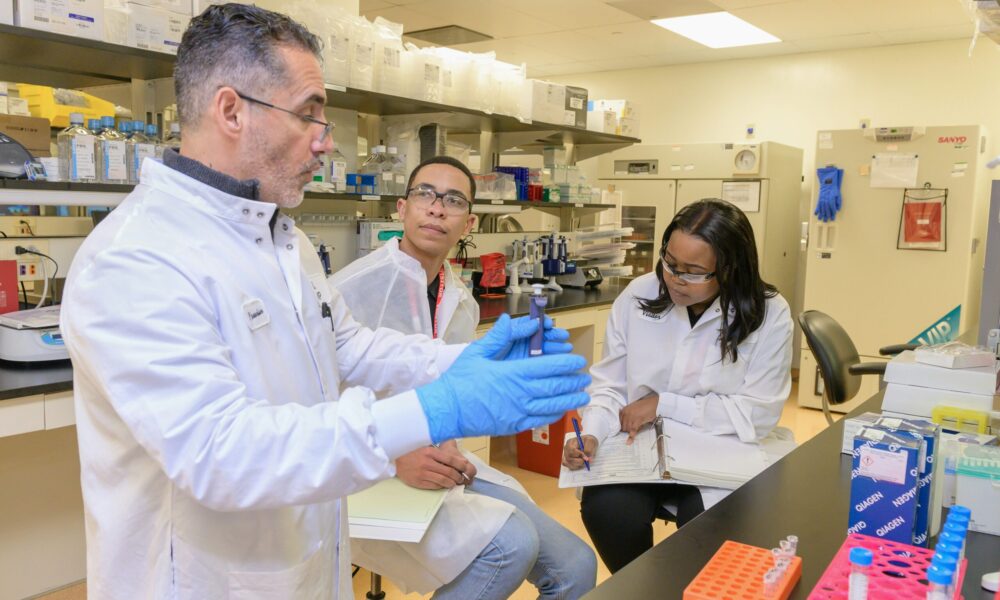April 30th, 2025 marked the 100th day of President Trump’s second presidential term. Here at UCS, we’ve been watching how the Trump administration has been abusing and co-opting science to advance its political goals across the federal government. Our effort has included tracking potential attacks on science, or where science may have been sidelined or threatened by the federal government.
Since my last summary released on April 2nd, we’ve counted 124 potential attacks on scientists, their work, and science-based policies in the federal government. That means that, since Inauguration Day, 343 of the administration’s actions, decisions, or policies may have undermined science or the scientific process. The impacts of these attacks—targeting individuals, grants, and entire agencies, will be felt across the country, undermining areas from medical care to water infrastructure. And as my colleagues and I have been shouting from the rooftops: when science is sidelined, people get hurt.
As always, this summary is a small snapshot of the tremendous chaos, legal dubiousness, and harm stemming from the administration over the past few weeks, and it is not a comprehensive analysis. But I do understand how a summary like this can feel overwhelming. If you’re looking for ways to help in the midst of all this havoc, then look no further than the bottom of this page. I’ve shared resources and action links that you (yes, you!) can use to help UCS in our fight to advocate for science in the federal government.
April was a busy month for the dismantling of federally funded research and willful neglect of the best available science in topics like healthcare and climate change. Below, I lay out how these attacks will impact research well into the future and describe some of the potential impacts that this politicization of science could have on the lives and health of Americans. (And as a content warning, I also very briefly discuss themes and statistics related to suicidal ideation and death in the second section.)
Pushing political agendas under the guise of science: autism
Members of the Trump administration, including our nation’s Secretary of Health and Human Services, are targeting autism (and people with autism) with misinformation, including a conspiracy theory about vaccines that has been disproven many times. As defined by the World Health Organization: “Autism spectrum disorders (ASD) are a diverse group of conditions. They are characterized by some degree of difficulty with social interaction and communication.” There is no definitive cause of autism, though the best available science indicates that it’s a genetic condition that may also be impacted by environmental factors.
Although the Trump administration halted multiple avenues to fund federal research on autism, it also recently directed the National Institutes of Health (NIH) to research its causes. This comes after the Centers for Disease Control and Prevention (CDC) announced a totally unnecessary study on a disproven connection to vaccines that has been debunked over and over, and hired a well-known vaccine skeptic to lead this research.
This means that the Department of Health and Human Services (HHS), despite its cutbacks on legitimate research, is spending federal resources and time to study an issue that’s been repeatedly and famously debunked, to be led by a discredited researcher with a history of conflicts of interest on the record. It’s possible that HHS has already decided what the outcome of this study will be and is working on manufacturing the evidence to support it. This is all occurring during one of the worst outbreaks of measles– a vaccine-preventable disease—in the United States this century.
Pushing political agendas under the guise of science: gender identity
The Trump administration has also targeted intersex (people born with sex characteristics that fall outside of the male/female binary) and gender non-conforming people (transgender and non-binary people), as well as gender-affirming care. Gender-affirming care includes a wide range of social acts (like changing clothes or pronouns), legal acts (including name or gender-marker changes), and medical acts (such as puberty blockers or gender-affirming surgery) that aim to affirm people’s gender identity (or one’s own internal knowledge of their gender).
Gender non-conforming people have a disproportionate risk of suicidal ideation and death. The numbers from a 2023 study are startling, showing that 81% of U.S. transgender adults have thought about suicide and 42% have attempted it. Medical doctors and researchers have spent years trying to care for and improve the outcomes for this population. The historical, well-established science behind gender-affirming care, as well as testimony of medical associations around the world, indicate overwhelmingly positive effects: it decreases depression, anxiety, suicidal ideation and death.
Despite this evidence, HHS recently released an unsigned report to sow doubt in the science behind gender-affirming care, as well as the safety of its medical forms. Besides the report contradicting the best available science, there are other big red flags about the publication: no major medical associations were involved in the process, and much of its evidence is pulled from another report heavily criticized by pediatric, public health, and psychological experts.
Also of note, some chapters were subject to peer review, but the entire report will be undergoing external peer review after publication. Peer review is a key pillar of scientific research and discourse, and allows other experts in the field to read, comment, and offer their expert opinion on whether the research is rigorous, valid, and reliable enough to be published in scientific journals.
Neglecting external peer review on such a highly discussed and politicized topic is an injustice to science and to the communities this report will impact. Personally, the choice to conduct peer review after publication is unheard of, and I’ve been a scientist for almost a decade and have published my own research for years.
After it axed all NIH-funded research on transgender health, the Trump administration directed NIH to focus research efforts on negative consequences of gender-affirming care and gender transitions, specifically “transition regret.” Transition regret occurs when a person feels remorse after receiving gender-affirming care. Transition regret research focuses on the aftermath of gender-affirming surgeries, which have a regret rate just like any other type of surgery.
However, gender-affirming surgeries have an incredibly low rate of regret, both when examining the prevalence of transition regret in isolation (see here, here, and here) and when compared to other surgeries and life decisions. Studies in this area often quote a 1% regret rate of gender-affirming surgeries, while this systematic review (or a methodologically and statistically rigorous examination of multiple scientific studies) found rates ranging from 7% to 47% when measuring regret after becoming a parent and receiving plastic surgery, respectively.
An unsettling shift in research priorities
Calling for more research to be conducted is not inherently a bad thing; after all, science is about conducting more research to grow knowledge. It can be especially beneficial if that knowledge facilitates awareness and informs policy to help communities who experience health inequities and systemic barriers. But this diversion of research in un-scientific directions are unsettling in the broader context of the second Trump administration. Consider the following:
- The Trump administration’s inclusion of anti-vaccine advocates in its cabinet and its constant attacks on the intersex and gender non-conforming communities.
- How the administration is requesting research on very specific components of these areas (already-robustly-disproven connections between vaccines and autism), not on the broader areas themselves (healthcare for autistic people).
- How it has gutted other attempts for experts to conduct research on these topics by altering funding requirements, redirecting federal research priorities, and firing massive amounts of federal scientists.
- How vocal the Trump administration has been about compiling research and scientists to help paint climate change as a positive when there’s undeniable evidence that it’s harmful for people and the planet.
- How it has rolled back scientific integrity policies that are in place to prevent outside interference in conducting science in federal agencies.
All these components together paint a very troubling picture of the Trump administration seeking to push political agendas forward under the guise of scientific research. All signs point to them co-opting science to allow them to draw the conclusion they want to find. This is straight out of The Disinformation Handbook. This would depart completely from the philosophy of science and scientific inquiry: science aims to seek objective truths not informed by political or personal ideologies. This is why it’s more important than ever for Congress to pass the Scientific Integrity (SI) Act, in the case that science is being so misused and ignored.
Federal science funding continues to be gutted
The ebbs, flows, and harsh cuts of federal funding and research programs have been a recurring theme in my monthly summaries since Inauguration Day. As a result of the massive layoffs at HHS initiated by Secretary Robert F. Kennedy Jr., many biomedical programs and offices have been shut down and halted. This included the first-of-its-kind research program on women’s health, the Women’s Health Initiative (WHI); an office focused on preventing different types of violence (like sexual abuse and gun violence); and a program that worked on preventing babies from dying in their sleep.
The good news is that the decision to close the WHI was seemingly overturned; the bad news is that even pausing, let alone shutting down, these critical types of research programs can mean bad results and lack of research for the populations being studied.
The so-called “Department of Government Efficiency,” or DOGE, has targeted the National Science Foundation (NSF) this past month, with awards and grants being frozen and later cut in a way similar to what’s occurred in other federal agencies since Inauguration. In addition to the now-familiar list of prohibited words and topics (like diversity, equity, and inclusion) being targeted and cut off from congressionally appropriated funding, NSF will no longer fund research focused on misinformation or disinformation.
It’s difficult to understand why NSF would want to stop research in an area that seeks to raise awareness of how false and misleading information is disseminated, unless it’s to benefit people who want to take advantage of these knowledge gaps.
However, research across fields and topic areas have been impacted, including STEM education, social, behavioral, and economic sciences, and computer and information science. This includes a project that sought to test the effectiveness of hurricane tracking software on airplanes that would have improved storm tracking and impacts. As of writing, there are now over 1,000 NSF grants that have been canceled in addition to the almost 800 NIH grants that have been cut.
From these estimates, that means there are almost 2,000 research questions that will be delayed or denied being answered by these cuts alone—research questions that would help the scientific community and society at large understand disease, engineering, severe weather, and more.
What now?
We’ll continue to watch closely for more developments in these areas and speak out against the ways that science is being politicized and undermined. But as I’ve said before: defending science in the federal government requires a concerted effort. As promised, if you’re looking for ways to help, here are ways to get involved in our work:
- Contact your members of Congress and urge them to cosponsor the SI Act using this easy link. The SI Act codifies protections for federal scientists and their work into law, which would make political and corporate interference like we’ve been seeing such Inauguration Day much more difficult.
- Watch our new video calling to save science and share it on your social media accounts and with your elected officials.
- Send a federal scientist our list of resources to help them know their rights.
- Stay up to date on our Save Science Save Lives campaign, including events scheduled to help educate and facilitate political action to protect science.

